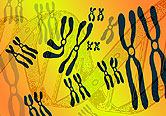- Could Your Grocery Store Meat Be Causing Recurring UTIs?
- Are You Making This Expensive Thermostat Error This Winter?
- Recognizing the Signs of Hypothyroidism
- 10 Strategies to Overcome Insomnia
- Could Artificial Sweeteners Be Aging the Brain Faster?
- Techniques for Soothing Your Nervous System
- Does the Water in Your House Smell Funny? Here’s Why
- Can a Daily Dose of Apple Cider Vinegar Actually Aid Weight Loss?
- 6 Health Beverages That Can Actually Spike Your Blood Sugar
- Treatment Options for Social Anxiety Disorder
Knowing Genetic Risk for Cancer May Not Change Behavior


As more genetic tests are developed that spot increased risks for certain cancers, one might think that high-risk people would be more proactive about getting screened.
But a new study suggests that, at least with colon cancer, knowledge does not change behavior: People who found out their genes doubled their risk of colon cancer were no more likely than people with average risk to get screened.
“It didn’t make any difference, not at all,” said study author Dr. David Weinberg, chairman of medicine at Fox Chase Cancer Center in Philadelphia.
Weinberg cautioned against using the findings to come to conclusions about the impacts of genetic tests for other cancers. Still, he said, the “modest amount of available data” suggests that genetic tests like the colon cancer one — which don’t confirm a huge increased risk of disease — don’t alter health habits.
The researchers were surprised by the results. “Our hypothesis was that this would be effective,” Weinberg said, especially considering that a person’s genetic makeup is so personal and “might be a more compelling motivator than something like their cholesterol level or a lifestyle choice like smoking.”
Dr. Durado Brooks, director of prostate and colorectal cancer with the American Cancer Society, agreed with Weinberg that the finding was surprising.
“The theory around genetic testing is that if you tell people they’re at a higher risk of disease XYZ, the hope is that they’ll modify their behavior,” Brooks said. “This does not support that hope or theory.”
Genetic tests have been a hot topic for several years as companies have begun offering them to the public along with insight about people’s risks of developing various diseases. One big question remains largely unanswered: What will people do differently, if anything, once they get a glimpse into what their medical futures may hold?
In this latest study, the researchers focused on 783 people aged 50 to 79 who hadn’t been screened for colon cancer recently. Of those, 541 of them were told that their genetic tests revealed their risk of colon cancer was doubled (about 1 in 20).
“That’s essentially the risk associated for heart disease with an elevated cholesterol level,” Weinberg said. “We made it very clear that this was only one risk factor. Whether or not that risk factor was present, everyone should get screened for colon cancer.”
Only slightly more than a third of those at high risk got screened within six months, a percentage that was identical to those with average risk.
What’s going on? Brooks speculated that the people in the study may be unique because they weren’t screened recently. As a result, they may be less likely to get screened in general, he said.
Weinberg said the extra risk in this case may not have been high enough to convince people to act. “It makes you wonder what’s going to happen if there’s more direct-to-consumer genetic testing,” he noted.
The study appears in the Oct. 21 issue of the Annals of Internal Medicine.
More information
For more about colon cancer screening, try the U.S. National Cancer Institute.
Source: HealthDay
Copyright © 2026 HealthDay. All rights reserved.










